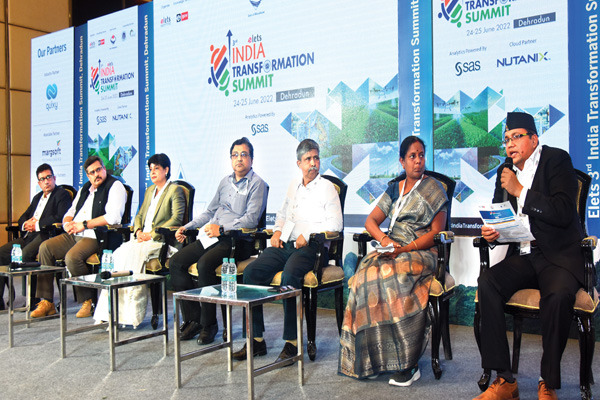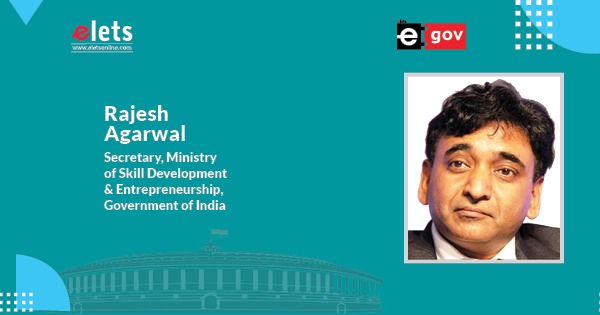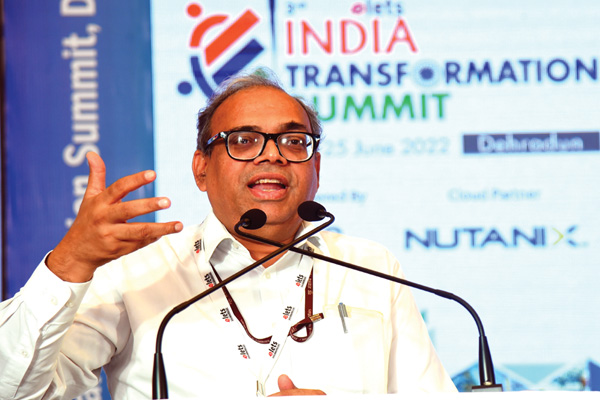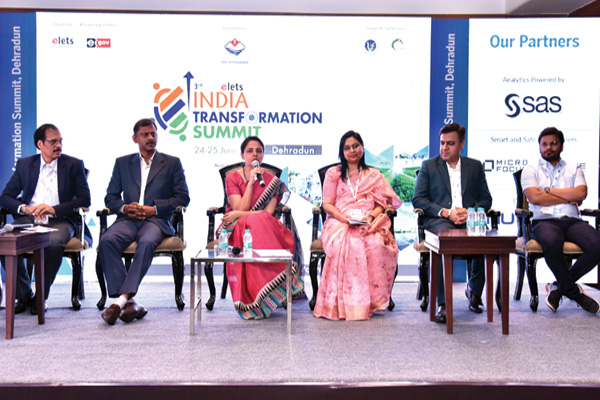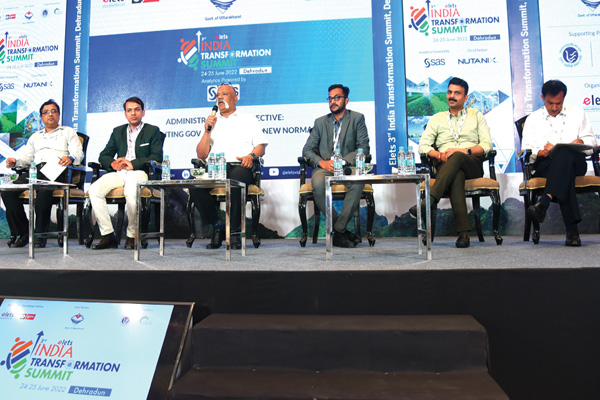
The energy sector of any country is an indicator of its development. It is interlinked with the growth of a nation. The more their economic prosperity, the more is their consumption of power. Addressing this, Asheesh Joshi, IAS, Director, Ministry of Petroleum & Natural Gas, Government of India; Anil Rawal, Managing Director & Chief Executive Officer, IntelliSmart Infrastructure Pvt. Ltd and Abhinav Sood, Business Advisory Industry Consultant, SAS India, spoke at the Elets India Transformation Summit.
The inevitability of the climate change crisis has prompted a renewed response from several countries of the world. They are planning to bring their emission to net zero by 2050. Recently, India also declared to bring its emission to net zero by 2070. From the Paris summit of 2015 to Glasgow summit 2021, climate change has been the central discussion.

Asheesh Joshi (IAS), Director, Ministry of Petroleum and Natural Gas
Speaking at the event, Asheesh Joshi (IAS), Director, Ministry of Petroleum and Natural Gas, said energy transition in the country has to be contextual in nature. It must take into account the growth trajectory, energy trajectory and energy consumption of India, both in terms of volume and per capita consumption. He mentioned the remarkable achievements of National Biofuel Policy 2018, saying India could only produce around 1 to 2 per cent in 2013-14, but now it is producing 10 per cent. He reiterated that achieving the 10 per cent ethanol blending target has translated into a forex impact of 41000 crore, reduction in emission of greenhouse gas by 2.7 mt tonnes.

He also added that India is on its way to comfortably achieve the next target of 20 per cent ethanol blending by 2025-26. “To ensure that the ethanol blending program is a success, the government has taken various measures like expanding feedstock production, giving timely remuneration to the farmers, bringing the GST slab down from 18 per cent to 5 per cent and signing long term agreements with various stakeholders,” he said.
Speaking on the sustainability of Aviation Turbine Fuel (ATF), he mentioned that being signatory to the International Civil Aviation Organisation (ICAO), India is bound by its mandate. “Civil aviation industry accounts for 2.5 per cent of global greenhouse gas emissions. So, the ICAO has set a target that by 2027, no additional emissions is permissible taking into account 2019 as the base year. Accordingly, the Indian Oil Corporation Limited (IOCL) is contemplating setting up two bio ATF plants. The Mangalore Refinery Project Limited is also going to set up one plant for bio ATF. These three plants together will have the capacity of producing 100 tonnes of fuel each day and the needs of the aviation sector will be significantly catered to.”

Civil aviation industry accounts for 2.5 per cent of global greenhouse gas emissions. So, the ICAO has set a target that by 2027, no additional emissions are permissible taking into account 2019 as the base year. — Asheesh Joshi
He concluded by saying that necessary steps are being taken to reduce our dependence on import of palm oils, farming of which is encouraged in the Northeast and Andaman region of the country.

Anil Rawal, Managing Director & Chief Executive Officer, IntelliSmart Infrastructure Pvt. Ltd
Highlighting the woes the power sector faces in India, Anil Rawal, Managing Director & Chief Executive Officer, IntelliSmart Infrastructure Pvt. Ltd., suggested the various measures which need to be taken in order to turnaround the image of this sector.
“Entire world is facing the extremes of climate change. Studies suggest that 570 cities in the world, of which 12 are from India, will be submerged in water by the end of the century. Glaciers are melting, water levels are rising, and air is getting polluted. All these things will result in drastic change of cropping patterns, jobs losses, dying of flora and fauna,” he said, adding that the country needs to reduce its dependence on fossil fuels.
He complimented the government for its renewable energy program, saying that giant strides are being taken towards energy transition and the target of 450 gigawatt of renewable energy would be comfortably achieved by 2030.
Speaking on the challenges of grid variability, he said it’s not easy to manoeuvre the power generation when one infuses renewable energy in the grids. He added that the focus should be on the demand side of energy consumption. “When the distribution companies (Discoms) face an energy shortage, they either prioritise their distribution or choose to shut down the plant, which is very undemocratic,” he explained, adding smart prepaid metres have been brought to address these issues.
To improve last mile consumption understanding and to enhance operational and financial efficiency of distribution companies (Discoms), he suggested that a top quality energy infrastructure should be built and a smart grid should be made operational across India.

Abhinav Sood, Business Advisory Industry Consultant, SAS India
“Digital transformation and analytics per se is going to play a huge role in transforming the power sector in India,” said Abhinav Sood, Business Advisory Industry Consultant, SAS India. “Lots of investment, policy intervention and regulatory mechanisms done over the years have resulted in improving only the hardware side of the power sector, but its technology part was missed. As our honourable Prime Minister emphasises on making India a $5 trillion economy, the role of GDP- Electricity- Elasticity concept becomes very crucial,” he added.
He said that several initiatives have been taken to bring down the distribution loss from 40 per cent to the current status of 20 per cent. Stressing upon the importance of Artificial Intelligence and Machine Learning (AIML), which is employed in data mining or data optimisation, he said, “Investing more on the billing system will not generate revenue for you, but making sense of the data which you collect, is going to drive your revenues. And this is how you can bring distribution loss down to 10 per cent.”
He suggested some key areas like supply side management, pricing of pontracts, metres analytics and reduction of operation and maintenance (O&M) cost, where greater focus should be given to bring real transformation in the energy sector of India.
He concluded his speech saying “Discoms need AIML to do predictive maintenance, maintenance optimisation, fault detection to subsequently and effectively lower their O&M and distribution costs.” He further added that “AIML can significantly help in addressing the issues of electricity theft, revenue leakages, administrative losses and financial crimes etc.”
Be a part of Elets Collaborative Initiatives. Join Us for Upcoming Events and explore business opportunities. Like us on Facebook , connect with us on LinkedIn and follow us on Twitter, Instagram.


